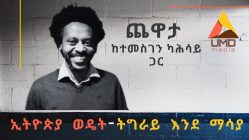ARTE unofficial translation, enhanced
ARTE Reportage https://www.arte.tv/fr/videos/109207-000-A/ethiopie-tigre-au-pays-de-la-faim/
By Charles Emptaz and Olivier Jobard
July 1, 2022
N.B. This is an unofficial translation done from French by M.S., timeline by J.N. (for UMD Media)
00:07: Children climbing in a tree looking for fruits to eat. “Are there any fruits? Give it to me! Did you get it? Here you go – hold on! Catch this, Abriha. Come on, take this one. Don’t let it fall!”
00:50: (Footage of children eating dry nuts from the tree as their impoverished mother holds a small baby, cries, and speaks.)
00:51: Mother: “We’re dying of hunger, and we don’t have anything to wear. All this is because of our enemies. It’s because of them that we’re here today. We cannot cultivate lands anymore. The situation of my children is disastrous due to famine.” (zoom on the face of the emaciated young mother)
01:30: (Footage of the landscape around Bomba village.) [Somewhere between Abiy Addi and the Tekeze River – note of the translator]
01:41: (Footage of rural Tigrayan children.)
01:42: Narrator: “In the north of Ethiopia, in the region of Tigray, Bomba is one of the areas to be hit by famine. Here no one eats enough to be full. Some are dying.”
01:44: (Footage of a man laying on the ground with severe starvation and swollen stomach.)
01:44: Starving man: “I cannot eat anything. I cannot swallow. It’s been two months since I’ve eaten. I can only drink water. Even when I drink, I’m hurting. It hurts me to drink.”
02:20: His mother (footage of her talking): “Last year, my son was doing well. But since two months ago, he’s not doing well. The situation fills me with anxiety.”
02:43: Starving man: “No one can take me to the health center. It’s very far away, and it’s the only place with medication. So I try to drink some holy water.” (Footage of his mother looking on.)
03:06: (Footage of burned-out military trucks along a rural road as a farmer walk by with some cattle.)
03:07: Narrator: “Before the famine, there was the war. In Bomba, the hills got hit by the fire about a year ago.”
03:15: (Footage of fighters shooting guns and rockets. Homes, fields, buildings, and trucks burning.)
03:16: Narrator: “Tigray is fighting its own country Ethiopia. The conflict is based on deep political rivalries. The new Prime Minister Abiy designated this region as the region to destroy. And now the people of Tigray can only depend on themselves. They are cut off and isolated, alone to fight their neighbors Ethiopia and Eritrea. Today they have to face the dramatic consequences of the blockade.” (Footage of burning vehicles.)
03:50: Rural woman (footage of her speaking and walking): “My burn on my hand hasn’t healed. I was trying to save my things from the flames. They burned everything – my homestead with three rooms, my seven beehives, my clothes, everything I owned, even my children’s things.”
04:10: Narrator (with footage of women and children in a small marketplace selling small amounts of goods): “The fighting has prevented them from sowing their fields. So there’s no harvest this year and not much to sell on the markets. For the victims of hunger, there is no safe haven nearby, only the small towns like Abiy Adi one hundred kilometers from Bomba. They have very little means.” (footage: panoramic view over Abiy Adi)
04:46: (Footage of a man being taken out of an ambulance on a stretcher.)
04:50: Narrator: Dr. Tesfaye directs a hospital with no more medicine, means, electricity, almost no more gas. The international help never reached here.
04:59: Dr. Tesfaye: “We need someone to help us. Everybody knows there is a big problem. But they are just talking about the problem, not about the solution. People are dying every day, every minutes. We are crying every time we see mothers dying due to the death of their kids. Rather than helping us, the NGOs just watch us. That’s what’s happening here.”
05:27: Narrator (with footage of a severely malnourished child in a hospital bed who desperately groans throughout the scene): “Since the war, Dr. Tesfaye receives more and more children who are victims of famine.”
05:45: Dr. Tesfaye: “This baby is one year and seven months old. He is severely malnourished. He should have been on therapeutic feeding by now. But we are not giving him milk, because we don’t have milk. He’s just getting oxygen and some medication. He stayed here in this condition now for two weeks. Six months back he was treated for the same case: malnutrition. It improved, and we sent him home. The mother couldn’t feed him at home, so she came back, because there is no food at home.” (The mother grimaces as she looks at her baby as the baby groans.)
Interviewer: “You don’t have any milk?” (Baby still groans.)
06:31: Dr. Tesfaye: “No, we don’t have any milk, any therapeutic food here.” (Dr. Tesfaye looks into the face of the baby as he groans.)
06:50: Footage of Dr. Tesfaye walking through the hospital ward: “We are watching many patients die of cancer and malnutrition. We are here to watch them die, nothing else. The operation cannot be done here. We should take him (a severely starved, skin-and-bones boy) to Mekelle to Ayder Hospital, but there is difficulty in transporting him. It’s clearly an effect of the war.”
07:31: (Footage of the severely starved boy with legs like toothpicks) Dr. Tesfaye: “Before that [earlier on], he could have gotten the medication and nutritional support. All of it would have helped him. But now we can’t do anything. We are just giving him supportive care only. We cannot give any further treatment. He is eleven years old and weighs eight kilograms, which is not…” [he begins to cry and can’t finish speaking].
(Footage of patients in the hospital)
08:19: (Footage of oxygen tanks outside the hospital) Dr. Tesfaye speaks: “After two days, the hospital will be devoid of oxygen. We may even stop accepting patients. We asked for fuel. There is no fuel. We only have one car left from the looting.”
08:39: (Footage of youth on a horse cart in the hospital compound; an asphalt road with a Red Cross truck, a destroyed tank, women in a refugee camp, watering of a small vegetable garden in the camp).
08:50: Narrator: “Since Tigray was besieged by its enemies, filling up your gas tank costs 650 Euros. Transportation is reserved to a few minibuses and rare humanitarians. Everywhere cities see makeshift camps popping up. They welcome tens of thousands of Tigrayans expelled from their lands by the enemy. Some cannot get up any more, such as this grandmother where hunger is killing her.”
09:30: (Footage of a younger woman sitting beside an elderly, starving woman in bed)
09:45: Elderly woman in bed crying: “I’m dying of hunger! It’s horrible! My intestines are hurting! My whole body has given up! My eyes, my heart, even my mouth! I hide it, because I have shame that someone will come and see me in this state. Hunger doesn’t kill you all the sudden. It destroys you little by little.”
10:12: (Footage of a refugee camp with firewood reserves; people on foot in a rural place and coming into a city; their goods are carried by donkeys. Footage of a group of hunger refugees, arriving in Mekelle)
10:17: Narrator: “Without help, many chose to take to the road for days of walking. They’re converging on Mekelle, a city in Tigray that has seen its population explode with the newly displaced people. Like many families of Bomba, this family had to flee their land to escape famine.”
10:38: (Footage of a mother with many children and youth around her.)
10:45: Mother: “There’s nothing to eat. We don’t have fertilizer to cultivate the land. We have finished all of our reserves, and we are desperate. There is nothing, there is no help. So we came here. [Footage of a boy with bloodshot eyes.] It’s been three months since we arrived. Here they are not peasants but seem to live better. In the city, the people help us a little bit. We have escaped the worst.”
11:17: (Footage of a small amount of chopped onions roasting in a pot with children sleeping on a dirt floor of a hut.)
11:22: Narrator: “To pay the rent of this hut, the family has to go to bed early, because tomorrow they will beg starting at sunrise.”
11:37: (Footage of the family walking through the street begging; street views in Mekelle; a man fills some fuel in his car with a plastic bottle.)
11:40: Narrator: “From morning to night, the family from Bomba roams around the streets of Mekelle. The richest, most modern city of Tigray is now using transportation by horse-drawn carriages. For thirty years, the political elites of Tigray ruled over Ethiopia. The new power has decided to isolate them, to siege them, to send the Tigrayans fifty years backwards.
12:07: (A mother with a crying baby on her back begs at the metal gate of a home.)
12:09: Mother: “In the name of holy Mary! help us!”
12:15: Narrator: “In Mekelle, the most fortunate who were preserved from hunger are side by side with the poorest war refugees. These two populations cross each other, mostly without even talking to one another.
12:18: (No one comes to the gate; she keeps walking and begging for help with her children.)
12:28: Woman: “Before my kids used to go to school. It’s become impossible to feed them, so we came here. I heard that there is a school here. But in reality, there is no school for them. They spend their days in the streets with me. My kids are depressed. They want to go back to the village.”
12:30: (Footage of the family wandering the streets; several children eat from a single plate in the street after a man brings them food. The children quickly eat what they can get.)
13:55: Narrator: “The war has hit every social class. Even if they have a roof over their heads, civilians don’t have a paycheck. Some know hunger. But everyone knows privations.
13:56: (Footage: night is falling, youth gathers in the street in the dark with their mobile phones.)
14:10: Youth: “What’s going on here is this. There is no electricity. No more Internet. They have to use VPN to use the Internet. We’re sharing information, videos, screenshots, that can’t gross the border. The speed is slow. They get it from VSats and NGOs. People are so desperate for information. That’s what we do here, every night at this time.”
14:58: Narrator: “In 2020, unlike the rest of Ethiopia, the region of Tigray refused to delay its election. After his re-election, the president of Tigray was immediately thrown into war provoked by his resistance to the power of the Prime Minister of Ethiopia, whose acts he denounces.
15:05: (Footage of citizens standing in line with ID cards to vote at a voting station.)
15:16: (Footage of Tigray’s president Debretsion.)
15:19: President Debretsion: “You know, human catastrophe is happening in Tigray because of this siege and blockade. It’s very clear. There is no transport, no communication, no power, no banking. It’s not just a siege. The whole thing is a blockade in every form. They hold everything. There is no movement at all. There is no in and out. They have decided to finish us, to kill us in this box.”
15:48: (Footage of patients in Ayder Hospital and a mother carrying her baby.)
15:51: Narrator: “In this besieged region, the Ayder Hospital in Mekelle is one of the rare facilities where we still find medication and powdered milk or formula. The hospital continues functioning thanks to volunteer work by all health workers. The pediatric services are overwhelmed. There are currently twenty babies in starvation stage. Little Arsema is two months old, and only weighs 1.8 kg. It is a case of malnutrition since birth. During her pregnancy, the mother suffered from hunger.”
16:23: (Footage of a doctor measuring the tiny, skin-and-bone arm of Arsema.)
16:23: Doctor: “We need to take this off first. We install her right here. According to the WHO’s international standards, this baby is at stage 3 [of starvation]. It’s the last stage. To heal the baby, we have to give her F100 powder milk. It’s a substitute for maternal milk. Then we have to give her medication. She is dehydrated.”
16:57: Arsema’s young mother (footage of her speaking): “If my baby had been treated in time since her birth she would not be in this state. Her disease was identified during my pregnancy. To take care of my baby, I had to leave my other kids. My baby is not stable. But the other ones are not doing much better. God gave me this baby, and I would love to save her. I need to make every effort for her. But my other kids are suffering. They are hungry. There is no one to take care of them. No one to give them anything to drink. They live in terrible conditions.”
17:53: (Footage of the mother holding tiny Arsema while she cries; she then prepares to leave the hospital with her baby. A man is there to accompany her and carry her goods)
18:14: (Footage of people kissing a church wall and praying around the church; scenery around St Mary Cathedral in Axum.)
18:23: Narrator: “In the heart of Tigray, in the city of Axum, this religious site houses the Ark of the Covenant, which holds Moses’ Ten Commandments. This makes it one of the large holy sites in Africa. But today the town is also hit by the war, hunger, and unemployment. The tour guide Ferdi Mekonen spent his whole life in Axum.”
18:39: (Footage of Ferdi Mekonen walking in Axum; a group of people, mostly women in traditional dress, are collecting bottles filled with holy water.)
18:45: Ferdi Mekonen: “There’s just a few people here now, not as much as it was before [in other years]. People are getting very hungry, and they have come to the church to pray for God to bring peace. The people where they are gathering are taking holy water. As you know, the federal government with Eritrean troops made a blockade to humanitarian aid access. The people have nothing to eat. They are trying to at least [be breaks down with weeping and cannot finish talking]. They are just drinking the holy water to fill their stomachs. [He continues weeping].”
19:59: (Footage of Mekonen crossing himself and bowing at the Axum church.)
20:00: Narrator: “For eight months, Eritrean troops occupied Tigray. Their presence in the holy city Axum created tension which led to a catastrophe about a year ago.”
20:13: Ferdi Mekonnen speaks near the St. Mary Church: “The mountain over there was the place where the Eritrean troops were stationed. They were targeting to loot the Ark of the Covenant. As they were trying to come down, the young people shouted at them. And they started killing them. So they started killing the youth in the morning [up to the night, and then] all night. Door to door, in every house, mostly behind the mountain, and here [in the old part of the town, between the mountain and the church]. Even here in this [church] compound there was shooting and death. About 1,200 young people, elderly people, and children have been killed. This is what happened: the massacre in Axum. They can’t kill the whole Tigrayans, but they were trying to avoid [eradicate] our culture.”
21:18: (Footage of Arsema’s mother walking in the outskirts of Mekelle with her baby on her back and other children run up to her.)
21:38: Kids: “Mommy’s back! Mommy’s back!”
21:46: Mother: “Honey! How are you!” (She kisses her son.)
21:57: Son: “Are you healed?”
21:58: Mother: “Yes.”
22:00: (Footage of mother with her baby and young children. They are together in a church with many priests chanting and women gathered together and babies crying.)
22:22: Narrator: “To protect her daughter [if she dies], the mother of Arsema has decided to baptize her with the other kids in the neighborhood. (Footage of priests singing religious songs in Ge’ez; then they baptize seemingly healthy as well as severely malnourished children; women hug one another.) In the face of the silence of the international community and while waiting for peace, the Tigrayans turn their face to the sky. For the family of Arsema and many others, it’s already too late.”
24:12: End. (Footage of women holding their babies as they cry.)
https://www.arte.tv/fr/videos/109207-000-A/ethiopie-tigre-au-pays-de-la-faim/






Im pretty pleased to find this great site. I need to to thank you for ones time for this particularly fantastic read!! I definitely loved every little bit of it and I have you saved as a favorite to see new stuff on your blog.